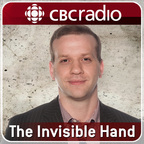
The Invisible Hand from CBC Radio
Summary: If you think you understand economics - and who does? - think again. The Invisible Hand, hosted by Matthew Lazin-Ryder explains why gouging is good, why non-profits should be profitable, and how supply-and-demand principles govern the world of love and marriage. It’s a defiantly non-dismal take on the “dismal science” of economics.
- Visit Website
- RSS
- Artist: CBC Radio
- Copyright: Copyright © CBC 2013
Podcasts:
Economists often use models to explain economic theory at work. In the simplest models, we humans are depicted as coldly rational beings who compute all our options, and act in our own self interest. This prototype of a person is called Homo Economicus. New thinking, however, is giving us a much more well-rounded view of human behaviour within economics. In this episode we reveal a new model of a man, Homo Economicus 2.0.
In this episode, we learn about perverse incentives. Incentives are the rewards you get for engaging in certain behaviours. They aren't always material rewards, and they can be created unintentionally. They can also have unexpected and negative consequences.
When times are tough, individuals and families often try to save a little extra in case they need it down the road. Politicians often talk about this kind of "belt tightening" for governments as well. But economists who follow the theories of John Maynard Keynes would say that approach is the wrong one for governments, and for society overall. On this episode, we explore the Paradox of Thrift, a concept that says when everyone saves all at once, overall savings can actually disappear.
Many economists think of the world as a great big marketplace. But sometimes, there are costs in the marketplace that aren't being paid by anyone. For example, when a factory makes widgets, and in the process also creates air pollution for people halfway around the globe. These costs are called externalities. How do you put a price tag on the future health of a hypothetical person half a world away? In this episode of The Invisible hand, you'll hear how some of those costs are being tallied up, and why many economists say there's one everyday product we've all been getting far too cheaply, for far too long.
In this episode, we ask an economist, an activist, and a former sweatshop worker a question: as consumers, can we help improve the lives of sweatshop workers by boycotting sweatshop goods? You'll hear their answers in Episode Six.
In this episode we explore how the same economic principle that can lead to insurance and mortgage fraud, can also ensure the economy continues to get a boost from business start-ups.
In this episode we look at the changing economic model of marriage and romantic relationships, and its impact on social and governmental policies.
In this episode, we talk profit, capitalism, and try to determine why some economists say the profit motive is what keeps a cherished Canadian institution alive.
In this episode we explore the value, price and utility of two commodities. When the gold standard of economic backup plans goes up against one of the most fowl, it's up to an economist to judge which one would be most valuable when traditional economies fail, like if there were a zombie apocalypse.
On this episode of The Invisible Hand, we try to figure out why price gouging could be seen as a good thing by economists.